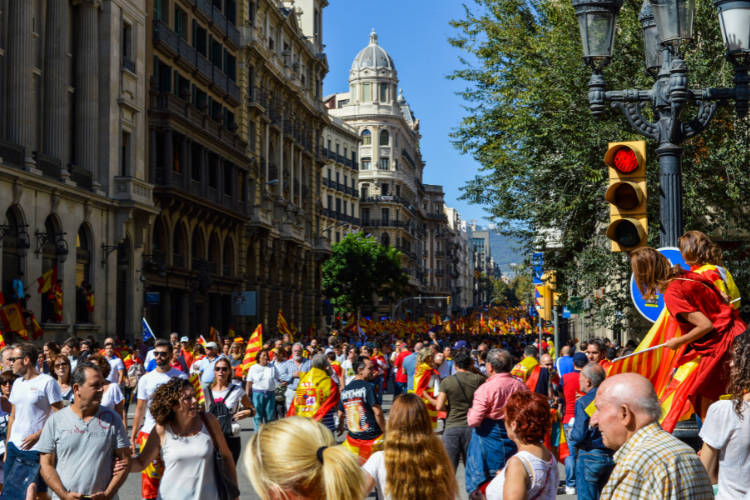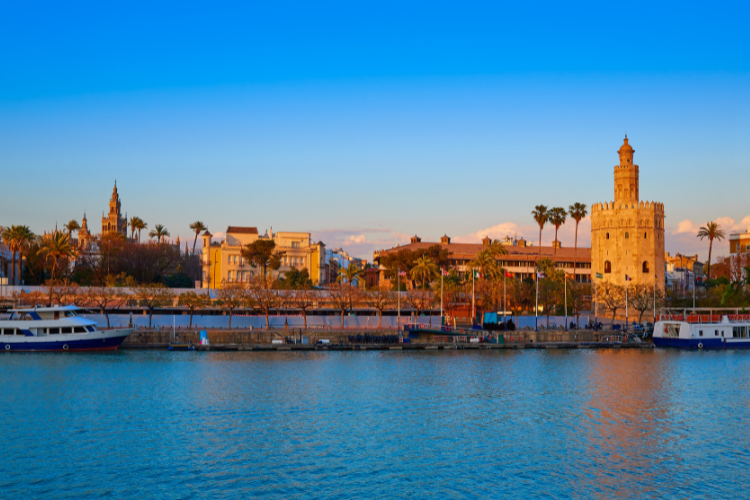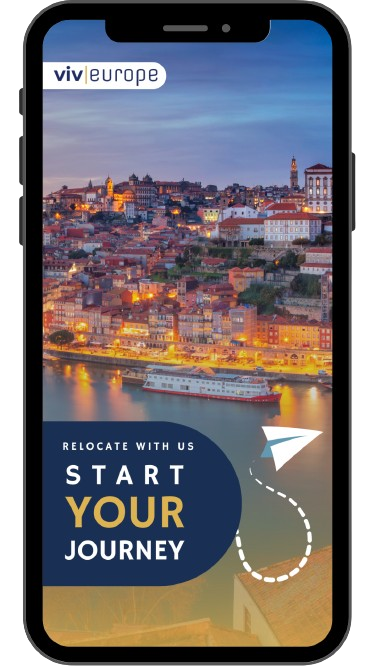Last Updated on December 16, 2024 by Laila Oliveira
When you move to a new country, successful adaptation is critical for your well-being. One of the things that help expatriates living in Portugal the most is learning Portuguese. Slowly but surely, it helps you accept the new culture and live with ease.
Of course, you’re not required to become fluent in a new language at this stage of life, but knowing at least the basics can help you immensely to get by on your own in the country. With time, learning new phrases and adapting to the local language is easier. But is it really necessary for expats to learn Portuguese?
In this post, we will present the main factors that can inspire you to learn to speak Portuguese, how and when to start and whether you really need to try. Let’s move on!
Do I need to speak Portuguese in Portugal?
Well, it depends on what you want from Portugal. This southern European country is famous for its receptivity and quality of life for a low cost of living. However, in many regions of the country, it is quite difficult to find people who speak English, let alone French or German.
Therefore, speaking Portuguese can come in handy on many occasions. For example, negotiating the rent, explaining symptoms at the medical center, solving some bureaucracy in public services, and so on.
Also, if you want to integrate with the Portuguese and make local friends, learning Portuguese is more than a good idea; it is highly recommended.
But that doesn’t apply in all cases. Many foreigners live in Portugal but do not socialize with the Portuguese. They live in their own expat community and don’t bother getting to know the local culture.
In any way, it’s always recommended to dive into the Portuguese language to start making yourself at home in Portugal.
Do expat families benefit from learning Portuguese?
If you’re moving with a family and kids and enroll your child in an International School, they’re less likely to come across the local language. Schooling is done in English, German, French, and Spanish, so they can feel comfortable without knowing how to speak Portuguese.
However, as they mix in with the culture while staying true to their own, it’s nice to learn Portuguese and make new friends in the neighborhood. Not only is it a great way for your children to adapt to this new lifestyle, but it can also help them feel less homesick.
The same goes for adults too! Your first few days might be extremely confusing, especially if you’re not living somewhere with a large expat community nearby. Not everyone speaks English, and getting your way around can be challenging.
Always remember that Portuguese people are welcoming and won’t be mad at you for not knowing the local language. Take your time to learn how to communicate, practice phrases at a coffee shop, and be surprised by how impressed people will be!
Learning Portuguese: the basics
If you already want to start learning Portuguese, we can give you some useful vocabulary tips in the day-to-day life of an expatriate in Portugal.
Greetings
People in Portugal spend a lot of their time outside of their homes. With the beautiful golden sun and perfect weather, it’s always a good idea to sit outside and relax. So you’ll come across many people just sitting at a café or a park nearby, sometimes with some company, other times just alone.
Since we’re often around other people, greeting them with a smile and a simple hello comes very naturally. Even if you’re not interested in having a long conversation, greeting a stranger in Portuguese can instantly bring a smile to someone’s face. Nobody will judge you for greeting a stranger; it’s common and appreciated!
Here are some words to learn to make someone’s day:
| English | Portuguese |
|---|---|
| Hello | Olá |
| Goodbye / Bye | Adeus / Tchau |
| Please | Se faz favor / Por favor |
| Thank you | Obrigado |
| You’re welcome | De nada |
| I’m sorry | Desculpe |
| Good morning | Bom dia |
| Good afternoon | Boa tarde |
| Good evening / Good night | Boa noite |
Meals
The Portuguese take their meals very seriously! You’ll often find them taking 2-hour lunch breaks and enjoying a cup of coffee on a weekday. They value spending time with their friends and don’t like to rush. So, you’ll find many people just bonding over lunch and planning their next one.
It’s part of the Portuguese culture to host family lunches on Sunday; it’s a way to spread love and come together to cherish being around loved ones. Pretty soon, you’ll get used to the culture and would like to celebrate meals just like we do.
Here are some words related to meals to add to your vocabulary:
| English | Portuguese |
|---|---|
| Breakfast | Pequeno-Almoço |
| Lunch | Almoço |
| Dinner | Jantar |
| Snack | Lanche |
| I’m hungry | Tenho fome |
| I’m thirsty | Tenho sede |
| Food | Comida |
| Drink | Bebida |
| Codfish | Bacalhau |
| Wine | Vinho |
| Beer | Cerveja |
| Water | Água |
Hospitals
This one might not be that pleasant, but it’s better to be safe than sorry. Even though Portugal is a tourist hot spot, many people still do not speak English and may only be able to communicate in Portuguese. You might want to learn some sentences beforehand to avoid unpleasant interactions during hospital emergencies.
It prepares you for the worst-case scenario and ensures that you don’t feel stuck during such situations. It’s already difficult to adapt to an entirely new healthcare system with new doctors, so communicating will be the last thing you would want to deal with.
Another option would be to access private healthcare in Portugal. Private hospitals are mostly equipped with better facilities, shorter queues, and doctors who can communicate in English. Nonetheless, it’s nice to know a few words during health emergencies, even if you’re not the one who needs to be rushed to the hospital.
| English | Portuguese |
|---|---|
| I feel pain here | Eu sinto dor aqui |
| It’s an emergency | Isto é uma emergência |
| Blood tests | Análises de sangue |
| Are there any doctors here? | Há algum médico aqui? |
Purchases
You’re bound to make some kind of purchase the same day you land in Portugal. Of course, it’s your new home, and you will want to explore it! Maybe a delicious snack you saw on the way home, a new lightbulb for your apartment, or perhaps a new piece of furniture you couldn’t get your eyes off of.
It’s good to know a few phrases you could possibly need at a convenience store nearby. You don’t necessarily have to purchase anything; you could just be asking for some change. So, how would you ask for that? We’ve got you covered.
| English | Portuguese |
|---|---|
| Do you accept card? | Aceita cartão? |
| How much does this cost? | Quanto isto custa? |
| Do you have change for 50 euros? | Tem troco para 50 euros? |
| Where is there an ATM? | Onde há um Multibanco? |
| That’s expensive. Can you give me a discount? | Está caro. Você pode me dar um desconto? |
Why you should consider online lessons
It’s convenient, affordable, and easy to follow! Especially after the Coronavirus pandemic, people in Portugal and all over the world began to value distance learning. The teaching of languages, mainly, is a modality that fits perfectly with the style of classes through the internet.
Learning Portuguese through video-calling classes with experienced teachers is currently the most practical way to do it. There is no need to travel to a language school physically. It’s also most preferred by expats who are still in the planning phase of their relocation or those who are still a year away from relocating permanently.
But of course, if you’re the type of person who misses the teacher’s physical feedback to learn, or you just don’t get along with technology, feel free to try whatever will help you learn better.
Let’s Move to Europe
With Viv Europe your plans for Europe will come to a reality
- Read Also: How To Move From The UK To Portugal.
Portuguese language teacher recommendations
As we at Viv Europe are Portugal experts with connections everywhere, we are lucky enough to know some great Portuguese teachers and courses to recommend to you. Here are some of them:
Always feel free to ask for help and clarity if you’re struggling with words or pronunciation. It’s never a bad thing, and no one will judge you for it. Learning a new language is difficult, so be proud of yourself, just like we are proud of you!
Attention: European Portuguese is different from Brazilian Portuguese
Although the Portuguese language spoken in Brazil is the best known internationally, it is not the one spoken in Portugal. Many Portuguese people even feel uncomfortable with this confusion.
In Portugal, people speak European Portuguese (also known as Iberian Portuguese), and the language has many differences from the Brazilian version. As well as American and British English, in Portuguese, there are differences in accent and vocabulary. So if you are going to live in Portugal, learn European Portuguese, not Brazilian Portuguese.
Knowing the language also means knowing the culture
Portugal has a lot to offer, not only in terms of landscapes and weather conditions. Portuguese culture is so rich, and it would be a huge waste to live in Portugal and not experience it. And that includes the Portuguese language.
The Portuguese way of life, the people’s warm welcome, and long lunches during the day cannot go unnoticed. Part of Portugal’s identity, of course, is present in the language, and vice versa.
As with any language, there are expressions and jokes that can’t be translated, unique words, and rhymes that lose their meaning in other environments. This is just another nice benefit of learning Portuguese.
Not everybody needs to speak Portuguese
Although recommended, you are not required to learn Portuguese to live in Portugal. Especially among immigrant communities, it is common for foreigners not to speak the local language and yet continue living their lives.
Cities like Albufeira or Lagoa in the Algarve, with a large resident population from the UK, have businesses with English-only signs and employers, English breakfasts served at all cafés and cultural events, and local newspapers made by and for the English community. It’s like having a little England in the middle of southern Portugal.
And besides, not everyone has the capacity or willingness to learn a new language. As long as you respect the Portuguese culture and its history, the Portuguese people will welcome you with open arms, trying to speak your language to make you feel welcome.
Are you ready to live in Portugal?
Adeus! This was your summarized guide on learning Portuguese. Do you think it was difficult or easy? We hope you can start practicing some phrases, but of course, only if you want to!
If you’re interested in joining the expat community in Portugal and learning Portuguese, it’s never too early to start getting to know people and sharing experiences. Join our Facebook Group – All About Portugal For Expats, and meet thousands of other expats who are in their own process of relocation to Portugal.
When you’re ready to kickstart your dream of relocating to Portugal, contact Viv Europe and receive the best professional guidance possible! We can help you learn the local language, get a visa, enroll your child in school, and find the best property for your use. Let’s start planning today!








